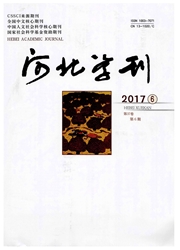

 中文摘要:
中文摘要:
罗近溪哲学的主旨并非仅仅在于其对所谓“赤子之心”的发明,也并非可简单地概括为所谓的“求仁为宗”。而那种近溪学说“近禅”的说法则更是流于对其思想的不可原谅的误读。与所有这些解读不同,一种更为深入的分析表明,其主旨应体现为近溪思想作为泰州学派“身道”的真正光大者,在把身体的“亲亲”之知体还原为“生生”之本体的同时,还与此一致地把整个世界理解为“身向家的生成”这一生命谱系的衍化活动及衍化过程,从而开显出中国哲学思想所特有的“家本”的理论深髓。这使得近溪学说的推出既可视为一种“后理学”意义上的对中国哲学的理论开新,又直续《易》、《礼》,代表了在中国文化业已步入“家道中落”乃至“无家可归”的历史境遇之际,新一代思想家对中国古老而悠久的“宗亲之道”、“宗法之道”的历史回归。
 英文摘要:
英文摘要:
The substance of Luo Jin - xi' s philosophy is not simply his findings of the so - called "utter innocence", nor can be summarized as the pursuit of a moral life. Especially, it is an unforgivable mis- reading that the doctrine of Luo Jin - xi is similar to Zen Buddhism. Different from all of above, a deeper analysis shows that Luo is surely the very people who brought "Body - Tao" of Taizhou School to a great height of development. He reduced our body's intrinsic quality of "loving relatives" to the noumenon of "production and reproduction". At the same time, he interpreted the word as a life process in which bodies generate families. From this viewpoint, he showed forth the dimension of "family principle", which is inherent in Chinese philosophy. So, the philosophy of Luo Jin - xi is not only a "post - Neo - Confucianism" theory renovation, but also a succession of Zhou -Yi and Zhou -Li . When the Chinese culture entered up on a new phase in which there was no place for "family", Luo' s philosophy showed that the new generation of the Chinese thinker returned to the ancient tradition of "loving - relatives - Tao".
 同期刊论文项目
同期刊论文项目
 同项目期刊论文
同项目期刊论文
 期刊信息
期刊信息
